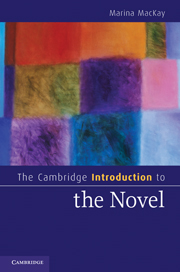Book contents
- Frontmatter
- Contents
- Acknowledgments
- About this book
- Chapter 1 Why the novel matters
- Miguel de Cervantes, Don Quixote (1605, 1615)
- Chapter 2 Origins of the novel
- Laurence Sterne, The Life and Opinions of Tristram Shandy, Gentleman (1759–67)
- Chapter 3 Narrating the novel
- James Hogg, The Private Memoirs and Confessions of a Justified Sinner (1824)
- Chapter 4 Character and the novel
- Nathaniel Hawthorne, The Scarlet Letter (1850)
- Chapter 5 Plotting the novel
- Gustave Flaubert, Madame Bovary (1857)
- Chapter 6 Setting the novel
- Charles Dickens, Bleak House (1853)
- Chapter 7 Time and history
- Virginia Woolf, To the Lighthouse (1927)
- Chapter 8 Genre and subgenre
- Graham Greene, The Ministry of Fear (1943)
- Chapter 9 Novel and anti-novel
- Thomas Pynchon, The Crying of Lot 49 (1966)
- Chapter 10 Novel, nation, community
- Salman Rushdie, Midnight's Children (1981)
- Chapter 11 Concluding
- Notes
- Glossary
- Further reading
- Index
- Cambridge Cultural Social Studies
Salman Rushdie, Midnight's Children (1981)
Published online by Cambridge University Press: 05 June 2012
- Frontmatter
- Contents
- Acknowledgments
- About this book
- Chapter 1 Why the novel matters
- Miguel de Cervantes, Don Quixote (1605, 1615)
- Chapter 2 Origins of the novel
- Laurence Sterne, The Life and Opinions of Tristram Shandy, Gentleman (1759–67)
- Chapter 3 Narrating the novel
- James Hogg, The Private Memoirs and Confessions of a Justified Sinner (1824)
- Chapter 4 Character and the novel
- Nathaniel Hawthorne, The Scarlet Letter (1850)
- Chapter 5 Plotting the novel
- Gustave Flaubert, Madame Bovary (1857)
- Chapter 6 Setting the novel
- Charles Dickens, Bleak House (1853)
- Chapter 7 Time and history
- Virginia Woolf, To the Lighthouse (1927)
- Chapter 8 Genre and subgenre
- Graham Greene, The Ministry of Fear (1943)
- Chapter 9 Novel and anti-novel
- Thomas Pynchon, The Crying of Lot 49 (1966)
- Chapter 10 Novel, nation, community
- Salman Rushdie, Midnight's Children (1981)
- Chapter 11 Concluding
- Notes
- Glossary
- Further reading
- Index
- Cambridge Cultural Social Studies
Summary
“I was born in the city of Bombay … once upon a time,” begins Saleem Sinai, the narrator of Sir Salman Rushdie's postcolonial classic Midnight's Children. But in keeping with what soon becomes recognizable as his Tristram Shandyish habit, Saleem immediately corrects his opening sentence: “once upon a time,” won't do, not when Saleem was born at midnight on the very day India gained independence from Great Britain, August 15, 1947, and is thus “mysteriously handcuffed to history, my destinies indissolubly chained to those of my country.” Saleem Sinai, also known as “Snotface, Stainface, Baldy, Sniffer, Buddha, and even Piece-of-the-Moon,” will go on to tell his life story, a narrative of identity formation where the identity being formed is not only his but his nation's (4).
The trouble with personal and national identities is that they must be both unitary and multiple. “I am the sum total of everything that went before me, of all I have been seen done, of everything done-to-me,” Saleem announces: “I am everyone everything whose being-in-the-world affected was affected by mine. I am anything that happens after I've gone which would not have happened if I had not come. Not am I particularly exceptional in this matter; each ‘I,’ every one of the now-six-hundred-million-plus of us, contains a similar multitude” (441). But that a self or a nation that is too divided threatens to crumble out of existence gives its urgency to Saleem's narration: he feels that he is breaking apart, disintegrating into “(approximately) six hundred and thirty million particles of anonymous, and necessarily oblivious dust” – or the population of India (36).
- Type
- Chapter
- Information
- The Cambridge Introduction to the Novel , pp. 172 - 175Publisher: Cambridge University PressPrint publication year: 2010



